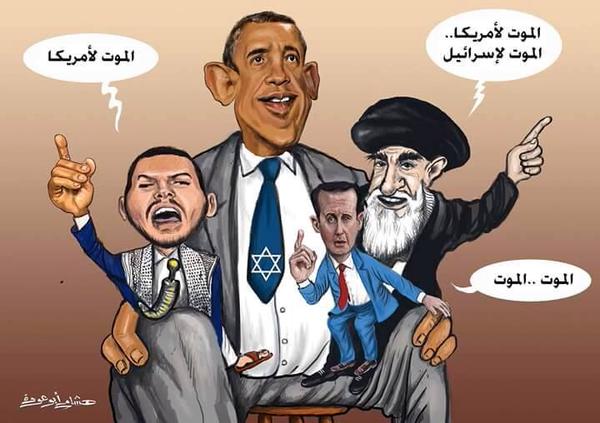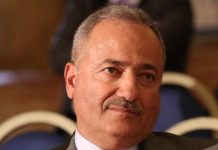The choice Iran faces in the region
Amir Taheri/Asharq Al Awsat
Friday, 29 May, 2015
Iran’s President Hassan Rouhani this week launched a stinging attack on critics of his administration’s foreign policy and reminded everyone that politics was all about choice.
“This government has chosen moderation and peaceful cooperation, and non-intervention in the affairs of other nations,” he asserted. At the same time he accused “a small minority with big microphones” in Tehran of promoting a perverted version of Iranian foreign policy with “fiery slogans” and “extremist language.”
There is no doubt that Iran has done much damage to itself and to others by overindulging in “fiery slogans” and “extremist language.” In many cases its bark has been more harmful than its bite. But in every case Iran paid a high price for the shenanigans of self-styled revolutionaries drugged by a sick ideology.
Nevertheless, to claim that the trouble is only with “fiery slogans” and “extremist language” may be a bit disingenuous.
The Khomeinist regime is also involved in actions that by no stretch of imagination could be described as “moderate” or “peaceful”.
There is no need to catalog all the harm that Khomeinist foreign policy has done to Iran, and so many other countries. This is a grim record, from the holding of hundreds of foreign hostages—ranging from Americans to Koreans passing by French and German citizens—and terrorist operations from Turkey to Argentina to the creation of militias in half a dozen countries.
What should concern us now is whether or not Rouhani is sincere in his denunciation of that “small minority with big microphones.”
That sincerity could only be tested by concrete choices and actions. In that context, two issues stand out: Yemen and Syria.
In Yemen, Rouhani no doubt realizes that the plan to re-enact the Lebanese scenario by creating a state-within-the-state based on a Yemeni version of Hezbollah has failed. There is no way Tehran could impose the Houthis as the arbiter of Yemen’s destiny. It is also clear that the international community, not to mention nations in the region, do not buy the Iranian narrative about Yemen. Tehran’s massive efforts in the region, and beyond, to garner diplomatic recognition for the Houthis have led nowhere.
In that context, Tehran’s policy of sabotaging the political process that might lead to a settlement acceptable to a majority of Yemenis simply makes no sense. The best that such a policy could achieve is to prolong the conflict, albeit on a lower scale.
The second issue is that of Syria.
The official media in Tehran now admit that the self-styled Syrian President Bashar Al-Assad now controls no more than 15 to 20 per cent of the national territory. In other words, he has been reduced to the position of one faction leader among many. The costly policy of perpetuating the fiction that Assad is president of Syria has brought no profit for Iran. By betting on a dead horse, Tehran has turned the overwhelming majority of Syrians against Iran. At the same time, it has prolonged the deadly conflict by financing and arming Assad’s losing faction.
Tehran’s “Assad-or-nothing” policy is doomed. Government sources in Tehran leak information about the increasing difficulty of bankrolling the Assad faction especially when Iran itself suffers from cash-flow problems. Tehran is also facing manpower problems with the Lebanese branch of Hezbollah, which has suffered heavy losses, reporting growing difficulties in recruiting volunteers for Syria.
Hopes that the Shiite community in Afghanistan might provide the needed cannon-fodder have also dimmed in recent weeks, despite the fact that Tehran has announced it would treat the families of Afghan “martyrs” in Syria as families of Iranian “martyrs.”
Sending Iranian “volunteers for martyrdom” in large numbers is also difficult and could risk a violent backlash at home. The regime is unable to explain why it is in Iran’s national interest to help Assad kill Syrians.
Earlier this week, even Russia, which has so far sided with Assad, indicated it was looking for other options. Last Monday, in a telephone conversation with British Prime Minister David Cameron, Russian President Vladimir Putin agreed to join a new initiative to end the Syrian tragedy. The formula according to which there is no place for Assad in the future of Syria is gaining ground both in Europe and the Middle East.
Even in realpolitik terms, it would be foolish for Iran to remain on a sinking ship.
Some analysts in Tehran believe that Rouhani is deluding himself by thinking that a deal with the US on the nuclear issue would enable Iran to assume regional leadership with tacit support from President Barack Obama. This is why he is still endorsing policies on Syria and Yemen that were developed before he became president.
It would be bad news if Rouhani were that naïve. Even if a nuclear deal is stitched at the last minute, Iran’s policy in Yemen and Syria has failed and no amount of support from a moribund Obama administration could reverse the trend.
Also, some analysts believe that Rouhani’s influence on shaping Iranian policy on crucial issues, including Syria, Yemen and Iraq, is minimal at best and at worst non-existent.
These analysts site a number of examples to back their claim. One such example came last month when Assad sent a big delegation to Tehran to demand more money and manpower.
The faction of which Rouhani is member encouraged mood music that was negative about Assad and his demands. A few days later, “Supreme Guide” Ali Khamenei sent his foreign policy adviser Ali-Akbar Velayati to Damascus to sooth an aggrieved Assad.
If that analysis is correct, Rouhani needs to put his own house in order before talking of “moderation” and “international cooperation.”
In other words, the Khomeinist regime can no longer play the role of both a responsible nation and an adventurous revolution.
Amir Taheri
Amir Taheri
**Amir Taheri was the executive editor-in-chief of the daily Kayhan in Iran from 1972 to 1979. He has worked at or written for innumerable publications, published eleven books, and has been a columnist for Asharq Al-Awsat since 1987. Mr. Taheri has won several prizes for his journalism, and in 2012 was named International Journalist of the Year by the British Society of Editors and the Foreign Press Association in the annual British Media Awards.
خيار إيران الوحيد في المنطقة
أمير طاهري/الشرق الأوسط/29 أيار/15
شن الرئيس الإيراني حسن روحاني هجوما حادا خلال خطابه هذا الأسبوع على منتقدي السياسة الخارجية لحكومته، مذكرا الجميع بأن السياسة ليست إلا خيارات، حيث شدد قائلا: «لقد تخيرت هذه الحكومة سبيل الاعتدال والتعاون، وعدم التدخل في شؤون الدول الأخرى». وفي الوقت ذاته وجه الاتهامات إلى «الأفواه الصغيرة ذات الأبواق الكبيرة» في طهران التي تروج لطبعة منحرفة من السياسة الخارجية الإيرانية مع تلك «الشعارات الحماسية» و«اللغة المتطرفة».
وليس من شك حول الضرر البالغ الذي تسببت فيه إيران لنفسها وللآخرين من خلال الانغماس في تلك «الشعارات الحماسية» و«اللغة المتطرفة». وفي كثير من الحالات كان النباح أوقع أثرا من اللدغ ذاته. ولكن في كل مرة تدفع إيران ثمنا باهظا للإشكالات التي يثيرها الثوريون المزعومون المخدرون بأثر الآيديولوجيات السقيمة.
ومع ذلك، فإن ادعاء أن المشكلة تقتصر فقط على «الشعارات الحماسية» و«اللغة المتطرفة»، ليس إلا ادعاء كاذبا بعض الشيء.
ويشارك نظام الخميني كذلك في بعض التصرفات التي لا يسع أي خيال أو تصور وصفها بالاعتدال أو السلمية.
ما من حاجة الآن إلى فهرسة كافة الأضرار التي ألحقتها سياسة الخميني الخارجية بالجمهورية الإيرانية وبالعديد من الدول الأخرى. يا له من سجل قاتم رهيب، من احتجاز مئات الرهائن الأجانب، من الجنسيات الأميركية والكورية والفرنسية والألمانية، إلى العمليات الإرهابية التي انتقلت من تركيا وحتى الأرجنتين، ثم تشكيل الميليشيات المسلحة في أكثر من ست دول في مختلف أنحاء العالم.
إن ما ينبغي أن يشغلنا الآن هو ما إذا كان الرئيس روحاني مخلصا، من عدمه، فيما يتعلق بإدانته الصريحة لتلك «الأفواه الصغيرة ذات الأبواق الكبيرة».
يسهل اختبار مثل ذلك الإخلاص من خلال الخيارات الراسخة والتصرفات الملموسة.
ولدينا، في ذلك السياق، مسألتان رئيسيتان: اليمن وسوريا.
في اليمن، يدرك روحاني من دون أدنى شك أن خطة إعادة تنصيب السيناريو اللبناني من خلال خلق دولة بداخل الدولة اعتمادا على النسخة اليمنية من تنظيم حزب الله، قد فشلت. فليس من سبيل تتمكن طهران من خلاله من فرض الحوثيين كحكام لتقرير مصير اليمن. كما أنه من الواضح تماما أن المجتمع الدولي، ناهيك عن دول المنطقة، لا يصدقون الخطاب الإيراني إزاء اليمن. فالجهود الإيرانية الحثيثة في المنطقة وخارجها لحشد الاعتراف الدبلوماسي بالحركة الحوثية لم تأتِ بنتائج تذكر.
وفي السياق ذاته، فإن سياسة طهران من تخريب العملية السياسية التي قد تصل بالأوضاع هناك إلى تسوية مقبولة من ناحية غالبية المواطنين اليمنيين لا معنى لها. وأفضل ما يمكن لتلك السياسة تحقيقه هو تمديد وقت الصراع، وإن كان ذلك يتم على نطاق أضيق.
والمسألة الثانية هي سوريا.
تعترف وسائل الإعلام الرسمية في طهران الآن بأن الرئيس السوري بشار الأسد لا يسيطر حاليا على أكثر من 15 إلى 20 في المائة من التراب الوطني السوري. وبعبارة أخرى، أنه انتقل إلى مرتبة أحد قادة الفصائل المتناحرة بين آخرين. والسياسة المكلفة للغاية في الترويج المستديم لرئاسة الأسد للبلاد لم ترجع على إيران بأي مكاسب تذكر. وبالمراهنة على ذلك الجواد الخاسر، حولت طهران الغالبية الساحقة من الشعب السوري ضدها. وفي الوقت ذاته، عمدت إلى إطالة مدة الصراع عن طريق إمداد «فصيل» الأسد الخاسر بالأموال والسلاح.
إن سياسة طهران «الأسد أو لا شيء» هي سياسة فاشلة. تسرب المصادر الحكومية في طهران معلومات حول الصعوبات المتزايدة لتمويل فصيل الأسد، وخصوصا أن إيران نفسها تعاني من مشكلات التدفق النقدي. كما تواجه طهران مشكلات في القوى البشرية مع فرع حزب الله اللبناني، الذي تكبد خسائر فادحة، ويرفع إليها تقارير تفيد بصعوبة تجنيد المزيد من المتطوعين للحرب في سوريا.
والآمال المعقودة على الطائفة الشيعية الأفغانية في توفير المزيد من المقاتلين لا تزال باهتة خلال الأسابيع الأخيرة رغم حقيقة مفادها أن طهران أعلنت أنها سوف تتعامل مع عائلات «الشهداء» الأفغان كما تتعامل مع عائلات «الشهداء» الإيرانيين سواء بسواء. وتكمن هناك صعوبة أخرى في إرسال «المتطوعين الإيرانيين للاستشهاد» بأعداد كبيرة، ويمكن أن تؤدي إلى ردود فعل عنيفة في الداخل الإيراني. ويعجز النظام الحاكم في طهران عن تفسير ماهية المصلحة الوطنية الإيرانية في قتل الأسد لأبناء شعبه.
في وقت مبكر من هذا الأسبوع، أشارت روسيا، التي اتخذت جانب الأسد حتى الآن، أنها معنية بالبحث في خيارات أخرى. ويوم الاثنين الماضي، وخلال محادثة هاتفية مع ديفيد كاميرون رئيس الوزراء البريطاني، اتفق الرئيس الروسي فلاديمير بوتين على المشاركة في مبادرة جديدة لإنهاء المأساة السورية. وتكتسب الصيغة التي تنص على أنه «لا مكان للأسد» في مستقبل سوريا، المزيد من الزخم في كل من أوروبا والشرق الأوسط.
حتى من زاوية السياسة الواقعية، فمن الحمق بالنسبة لإيران أن تبقى على متن السفينة الغارقة.
يعتقد بعض المحللين في طهران أن روحاني يخادع نفسه بالتفكير في أن الاتفاق النووي مع الولايات المتحدة من شأنه تمكين إيران من استعادة الزعامة الإقليمية مع دعم ضمني من قبل الرئيس باراك أوباما. وذلك هو السبب وراء تأييد السياسات الإيرانية الحالية تجاه سوريا واليمن التي أعدت خططها قبل وصوله إلى رئاسة البلاد.
سوف تكون أنباء سيئة للغاية إذا بدأ روحاني بمثل تلك السذاجة. وحتى إذا أبرم الاتفاق النووي في اللحظة الأخيرة، فإن سياسة إيران في اليمن وسوريا قد فشلت، وأي قدر من الدعم يصل من الرئيس أوباما، المنتهية فترة ولايته قريبا، لن يمكنه تغيير ذلك الاتجاه الحالي.
كذلك، يعتقد بعض المحللين أن نفوذ روحاني في تشكيل السياسة الإيرانية حيال القضايا ذات الأهمية، ومن بينها سوريا، واليمن، والعراق، هو عند أدنى درجاته على أفضل تقدير، ولا نفوذ له بالأساس على أسوأ تقدير. يذكر أولئك المحللون عددا من الأمثلة تؤيد دعواهم. وأحد تلك الأمثلة ظهر الشهر الماضي حينما أرسل الأسد وفدا كبيرا إلى طهران للمطالبة بالمزيد من الأموال والقوة البشرية. وجاءت إثر ذلك رسالة شديدة السلبية، من طرف الفصيل الذي ينتمي إليه روحاني، حيال الأسد ومطالبه. وعقب ذلك بأيام قليلة، أرسل علي خامنئي المرشد الإيراني الأعلى مستشاره للسياسة الخارجية علي أكبر ولاياتي إلى دمشق لتهدئة الأجواء مع نظام الأسد المتضرر.
وإذا كان ذلك التحليل سليما، فإن روحاني في حاجة ماسة إلى إعادة ترتيب المنزل الإيراني من الداخل قبل الحديث عن «الاعتدال» و«التعاون الدولي».
وبعبارة أخرى أقول: لا يمكن للنظام الخميني الاستمرار في اللعب على كل الحبال من حيث كونه دولة مسؤولة وثورة مغامرة في آن واحد.






















